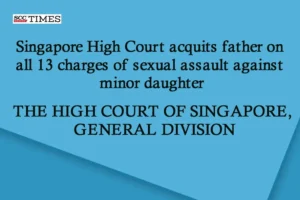The High Court of Singapore, General Division: A father accused of sexually abusing his minor biological daughter on 13 grounds under the provisions of the Children and Young Persons Act, and the Penal Code, was acquitted by Thean Valerie J. on all grounds. The Court said that due to the many inconsistencies in the prosecution evidence, it failed to prove their case beyond reasonable doubt. The Court stated that acquittal is required even where the accused person’s testimony contains discrepancies, so long as there remain significant inconsistencies in the Prosecution’s case that generate a reasonable doubt.
Background
The Complainant, C, is the biological daughter of the accused, charged with committing 13 sexual offences against his daughter from 2012 to 2019 when she was 5-6 years until age 12. The offences ranged from exhibiting obscene object, incidents of fellatio to statutory rape.
The accused denied all the charges and contended that none of the alleged instances of sexual abuse occurred. The charges against the accused lay under- Section 7 (a), Children and Young Persons Act, Ss. 293, 375, and 376 of Penal Code.
Legal discussions and judgment
Upon perusing the medical evidence presented before the Court, it said that although the evidence reveals that the complainant was sexually active, however, the same does not corroborate or provide a link that she was sexually assaulted by the accused.
While analyzing whether C’s complaints itself were corroborative, the Court noted that Section 159 of the Evidence Act (“EA”) allows former statements to be corroborative evidence. The Court, while referring to Public Prosecutor v GCK [2020] SGCA 2 (“GCK”) said that, to determine whether there is such liberal corroboration, the Court will focus on the substance, relevance, and confirmatory value of the evidence in question.
Regarding the same, the Court relied on AOF v Public Prosecutor [2012] 3 SLR 34 (“AOF”), wherein it was held that the victim’s complaint (within the medical report) could not be liberal corroborative evidence of her account of events, since the interview was conducted three to five years after the purported act. Therefore, the court will examine the extent to which the evidence is supportive or confirmative of the complainant’s testimony at trial.
Lee Kwang Peng v Public Prosecutor [1997] 2 SLR(R) 569, wherein the court held that the complaints by the complainants could not be corroborative evidence under S. 159 of the EA since they were made over a year post the alleged incidents. Even when complaints are made in a timely manner, the fact that such corroboration is non-independent is likely to adversely affect the credibility accorded to it.
The Court discussed the notion of liberal corroboration at length, and postulated 4 conceptual constraints that it is subject to, which were:
1. To corroborate the testimony of a witness, any former statement made must be made at or about the time when the fact took place;
2. Liberal corroborative evidence must, at the minimum, relate to the facts which form the basis of the charges pressed by the prosecution;
3. The liberal corroborative evidence should not be inconsistent with the evidence that it seeks to support, i.e., the complainant’s testimony;
4. Any subsequent non-independent and self-serving testimonies, even if assumed to be liberal corroborative evidence, will adversely affect their weight before the court.
The Court lay emphasis on the case of Public Prosecutor v Mohd Ariffan bin Mohd Hassan [2019] 2 SLR 490 wherein it was held that the nature of the inconsistencies and their effect on the credibility of the complainant must be considered in the light of the facts of each case.
The Court stated that in the instant case, when viewed holistically, the facts surrounding each charge create a reasonable doubt vis-a-vis occurrence. The Court pointed out that the prosecution has not met its burden of proving the offences beyond a reasonable doubt. Referring to GCK, the Court highlighted that acquittal is required even where the accused person’s testimony contains discrepancies, so long as there remain significant inconsistencies in the prosecution’s case that generate a reasonable doubt.
Further, responding to the prosecution regarding “no motive to falsely incriminate the accused”, the Court reaffirmed that it is not for the accused to prove that the complainant had some reason to falsely implicate him. The function of the trial process is to ascertain whether guilt is proved beyond a reasonable doubt.
Concluding, the Court said the 13 charges allege a history of grooming and abuse over years, due there being involvement of multiple years, events and charges, hence the inconsistencies in the complainant’s evidence are to be expected. However, the contradictions concern key foci in the narrative. Independent or reliable corroboration is absent. Whilst the complainant presented as a young witness trying her best to remember, the question of whether a complainant is unusually convincing must be premised upon the reliability of her evidence. It may be that the passage of time, coupled with her youth at the time of the offences, made clarity and recollection difficult. “Human memory is frail.”
Notwithstanding, Thean Valerie J. said that timely disclosure, effective investigation and prompt trial are necessary in sexual abuse cases involving young complainants.
[Public Prosecutor v. CAX [2024] SGHC 75, decided on 21-03-2024]
*Judgment by Justice Thean Valerie
Advocates who appeared in this case :
Advocates for Prosecution: David Khoo Kim Leng, Angela Ang, Tay Jia En and Kelly Ng Wei Qi
Advocates for Defence: Ramesh Chandr Tiwary and Cory Wong Guo Yean

